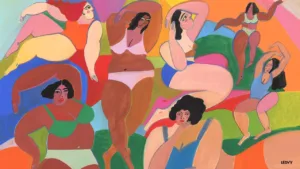“It will be over by Christmas,” everyone said last year. Be it the Russian troops who were certain of their swift victory, the international political community assuring the public that Ukraine would not endure a year of conflict, or Ukrainian families abroad praying for the war to end to reunite at home. Home, a haven steeped with decades-old Christmas traditions – the soothing aroma of cinnamon and bergamot candles, the comforting scent of familiar dishes on the Christmas table, the warmth and joy of family gatherings, and brimful glasses of champagne toasting to a new year. But, as with every year, not everyone is destined to go home. Some loved ones miss their flights, other relatives’ cars break down on ice-cold roads, and some lose more than a place – they lose a home or even a person.
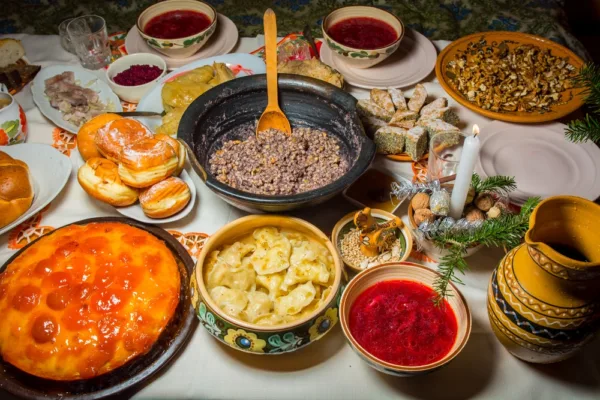
This year, Ukrainians counted “Second Christmas spent in war,” gazing at a table adorned with 12 traditional dishes that are an inseparable part of Ukrainian culture. The dishes must be eaten in a particular order, each being a meaningful symbol. You start with kutia, the most important dish on the Ukrainian Christmas dinner table, consisting of boiled wheat generously seasoned with honey, poppy seeds, nuts, and dried fruits. You continue with holubtsi (cabbage rolls stuffed with rice, and mushroom), then varenyky (dumplings with a variety of different fillings), later you taste some borshch, followed by some sichenyky (patties with peas) and fish as the symbol of Christ. Don’t forget about the deruny (fried potato pancakes with onions) accompanied by some boiled potatoes smeared with crushed garlic and stewed cabbage for strength and unity in the approaching year. Pancakes that resemble the sun represent hope and a glass of uzvar (compote, a rich and fragrant decoction of dried pears, apples, plums, and apricots) to wipe out your thirst. Finally, the last dish is bread, an enduring symbol of perseverance and struggle for freedom in Ukraine throughout its history. It forever has been the symbol of life, death, and resurrection in Ukrainian culture. It is so honored that even if it falls off the table, it must be picked up, kissed, and eaten because no bread is ever thrown away.
Yet, when Ukrainian families count the dishes, the years have gone by, they notice that faces are missing, some chairs remain unfilled, people who have lost their homes, and people who have lost their way and have never come back home united in shared grief. “Home is where the heart is.” some say, but what happens when the heart is torn apart by loss? By a loss, it had no control over, a loss because of faith in that your home and your people are good and do all they can to build a new home, a better one for your children to live in. Where is this ravaged heart, if not in a sealed box far away, in an attempt to protect it from the missiles that find their way in any way? They always hit their targets.
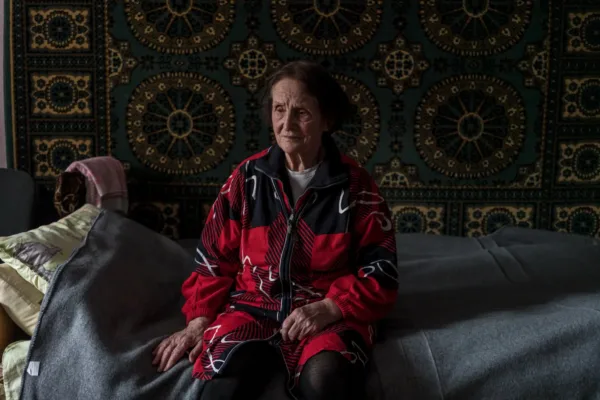
During the festive season, Ukrainians and all the people whose home is poisoned by war are reminded that no matter how far one hides, the war will always find you; no matter how hard you try to hide it, it haunts you. And even when visiting your land, your grandparents’ house on Christmas, it offers no refuge for the heart that is bleeding for an uncle you lit a candle for, your cousin who kisses the cherished photograph of his son in the barracks, or your grandmother who will never get to see her son again convinced that everyone has abandoned her in her lonely home, even her granddaughter does not visit her anymore.
So when you look back and think of everyone who asked, “Are you going home for the holidays?” only some heard the word ‘home’ ring in their ears, echoing through a maze of memories searching for a place to call home, and John Lennon’s song always came to mind with him wishing a “Happy Christmas” but overpowered by the desperate wish for the song’s lyrics to materialize: for war to be over, so everyone can go home. While almost everyone went home this Christmas, many Ukrainians were lost in the relentless question: where is home now?
The Global Peace Index of 2023 (produced by the Institute for Economics and Peace) plummeted again. The toll of deaths from global conflict has increased by 96% worldwide, especially in countries like Ethiopia, Myanmar, Israel, South Africa, Palestine, and, naturally, Ukraine. Amidst these striking figures, the Chinese blockade of Taiwan emerges as another financial crisis that will cost the world $2.7 trillion – nearly double the losses experienced during the 2008 global financial crisis. The GPI also showed that conflicts are becoming more internationalized, with 91 out of 195 countries engaged in some form of external conflict. More than half of the world finds itself succumbing to violence.
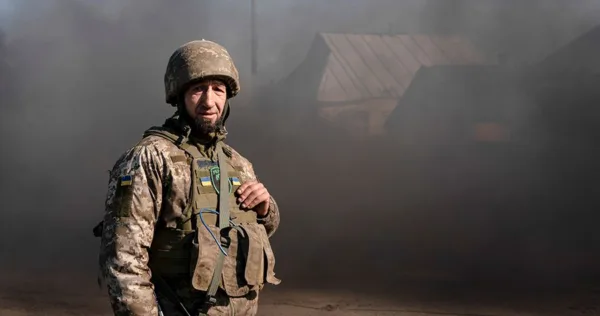
Nevertheless, people celebrated and joyously sang carols on the beautifully decorated streets. Though, there is one carol in particular that everyone recognizes. Everyone has heard it at least once, if not more, be it in films like the all-known Christmas classic Home Alone or choirs performing it in Carnegie Hall in New York when the city becomes one of the gems of the holiday because singing unites people no matter their beliefs or who they are. It is the Carol of the Bells, a globally renowned Ukrainian carol known initially as “Shchedryk,” stemming from the word ‘shchedryj’ meaning ‘bountiful .’ Since its first performance in the United States in 1921, it has been sung by Barenaked Ladies and even Beyoncé.
However, the English lyrics sung to the captivating melody are not a direct translation of the song. Instead of wishing ‘Happy Christmas,’ the song narrates the tale of a swallow flying into a household to announce the plentiful year that the family will have. Leontovich, a Ukrainian composer who dedicated his life to arranging Ukrainian folk melodies and lyrics for choirs in hopes of promoting Ukrainian rich musical heritage, was the original composer of “Shchedryk .” The concert hall was completely sold out when the Ukrainian National Chorus performed it in Carnegie Hall in the United States on October 5, 1921.
Soon after, the American choir director Peter Wilhousky wrote new lyrics for the song as it reminded him of the Christmas bells. He published the piece with the new lyrics in 1936, even though the song had already been published two decades earlier in Soviet Ukraine. Today, it is famous worldwide, but its Ukrainian heritage and meaning are not always recognized. Few people realize that “Shchedryk” is not just any well-wishing song sung by teenage girls going house to house singing the tune in celebration of the new year, but a revolutionary statement during a time when there was intense political and social struggle for Ukraine’s national identity.
Folk songs are a big part of Ukraine and its culture. There are so many Ukrainian folk songs it is almost impossible to count them all. They were a part of everyday life, but most importantly, they wielded the power to bolster people’s spirits, and Leontovych recognized this. Throughout his career, everywhere he went, he organized choirs who’d perform arrangements of Ukrainian, Jewish, Armenian, and Polish songs, giving a voice to all the oppressed ethnic communities not only during the Soviet era but even under Czar Nicholas II’s reign, when he was exiled and forced to live in his home province what is now central Ukraine.
In 1919, two years after the Bolsheviks’ revolution, Russia still refused to recognize the independence of the Ukrainian People’s Republic. Meanwhile, the world’s greatest powers were gathering in Paris to define the new borders of Europe. Symon Petliura, the first president of the emerging Ukrainian nation, had an idea to send the country’s choir on an international tour to promote international support for Ukrainian independence. And so, over the next two years, the Ukrainian National Chorus sang in 45 cities in 10 European countries and in the United States, receiving international praise and legitimation.

Unfortunately, the hope for a sovereign Ukrainian nation was crushed in 1921, as the country that the choir was defending no longer existed when the Bolsheviks had completely overrun the state and, with it, Mykola Leontovych, a Ukrainian composer, choral conductor, and teacher. A man approached him and his family during the Eastern Orthodox celebration of Christmas, asking them to let him stay over for one night. Open-heartedly, they welcomed the stranger into their home. The next morning, the agent pulled out a rifle and shot Mykola Leontovych.
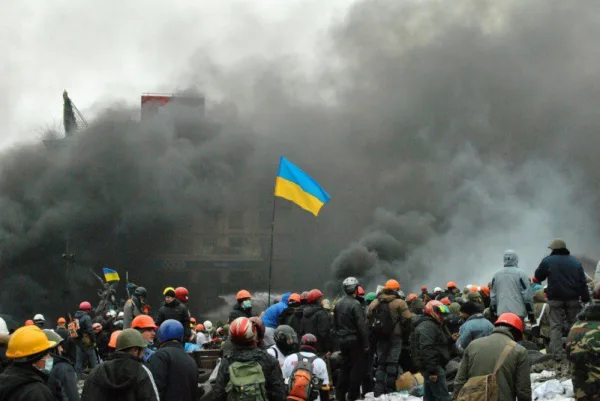
Christmas is more than a cheerful holiday for Ukrainians. It is yet another reminder of the oppression and the Ukrainian enduring struggle. This year, let the “Carol of the Bells” serve as a testament to how still, a century later, Russia continues to murder Ukrainians, and how despite it all, Ukrainians keep on singing. as folk music has always been one of the manifestations of the withstanding, unwavering spirit of Ukrainians and many other nations. The rich folklore history is only one more manifestation of the unwavering spirit of Ukraine and the Ukrainian saying,
“We are unbreakable.”
Featured image: Maxym Marusenko/NurPhoto via Getty Images



